外研(新标准)版七年级下Module 8 Story time知识点讲解课件(51张ppt)
文档属性
| 名称 | 外研(新标准)版七年级下Module 8 Story time知识点讲解课件(51张ppt) | 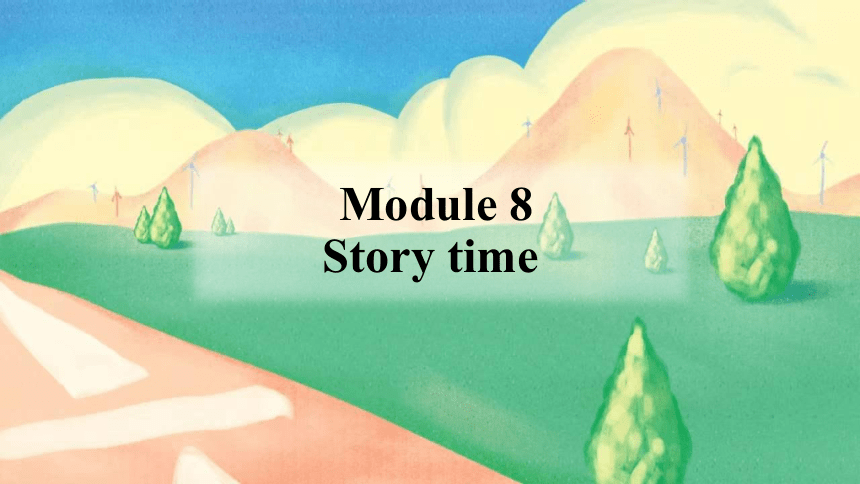 | |
| 格式 | pptx | ||
| 文件大小 | 237.0KB | ||
| 资源类型 | 教案 | ||
| 版本资源 | 外研版 | ||
| 科目 | 英语 | ||
| 更新时间 | 2022-01-16 12:42:27 | ||
图片预览

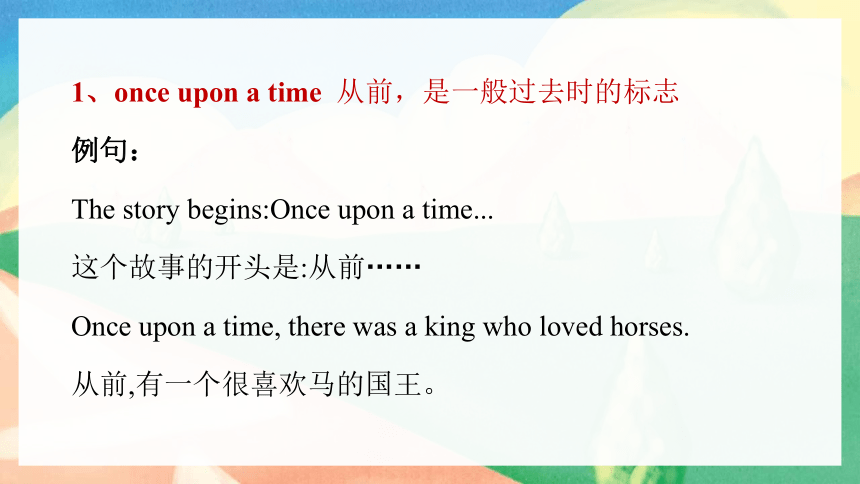
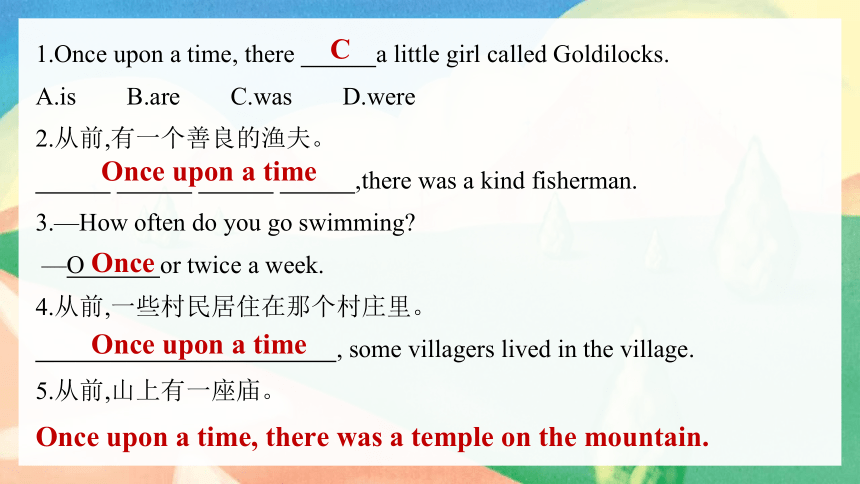
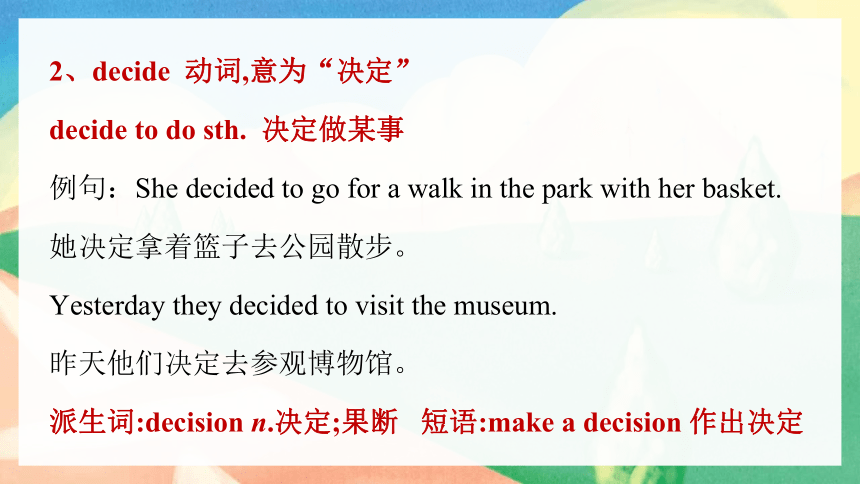
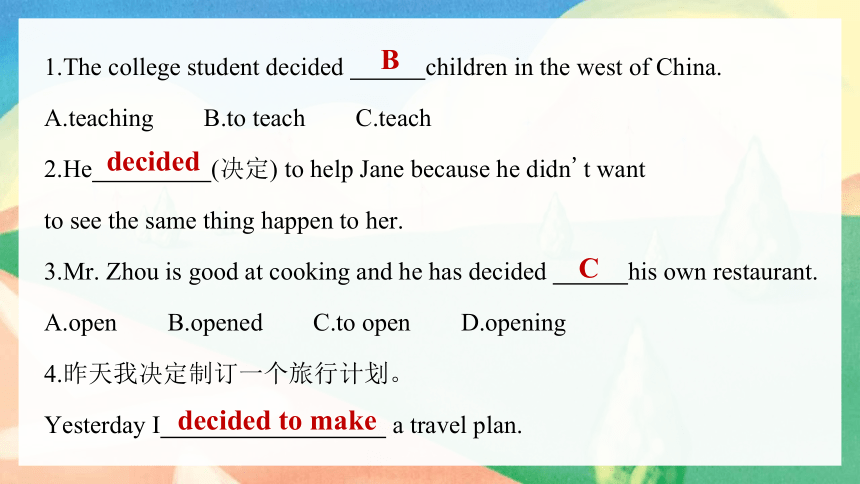
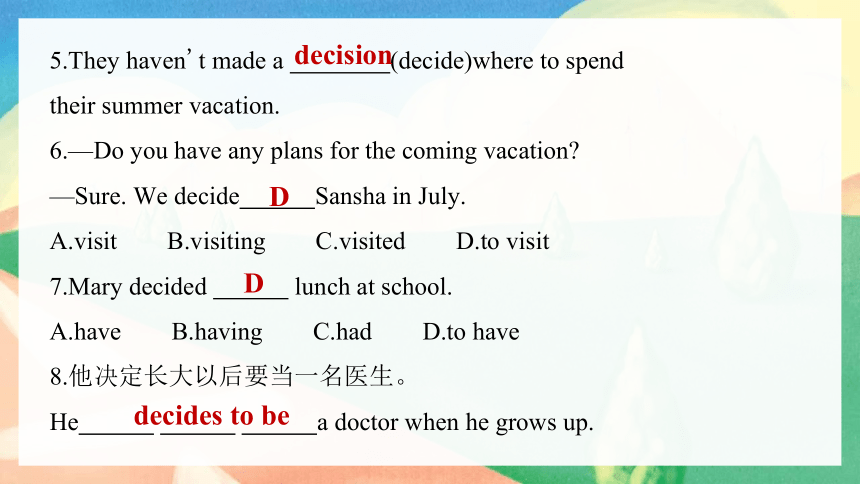
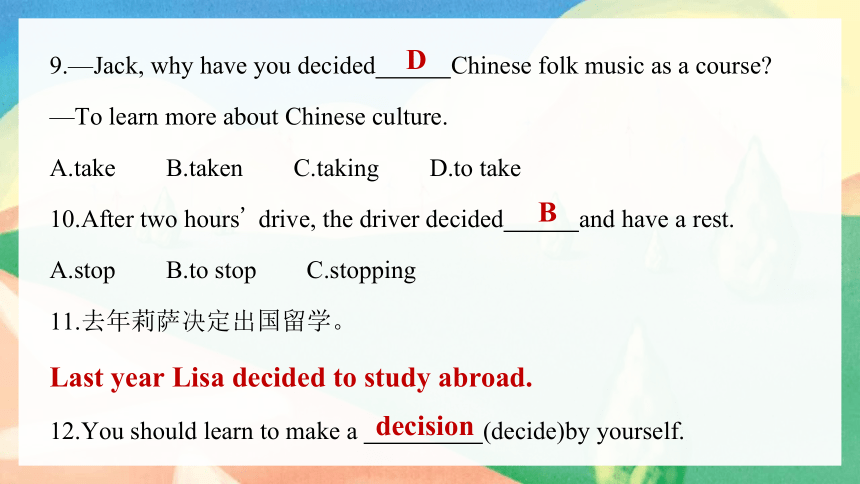
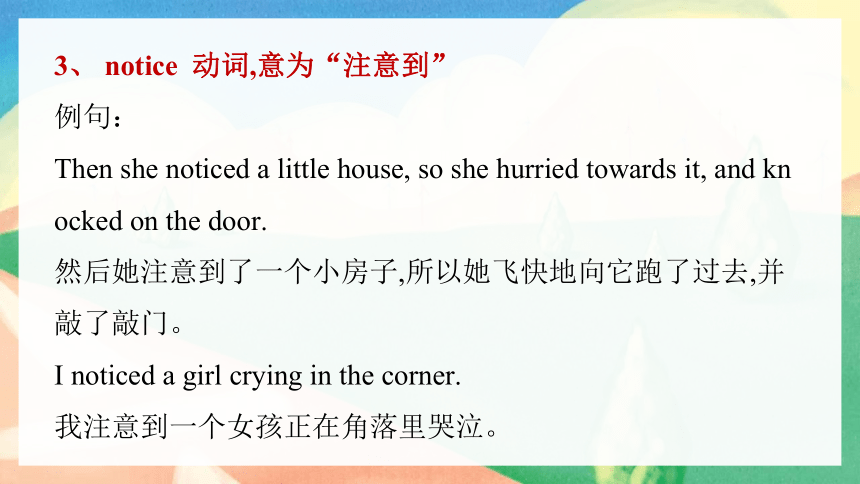
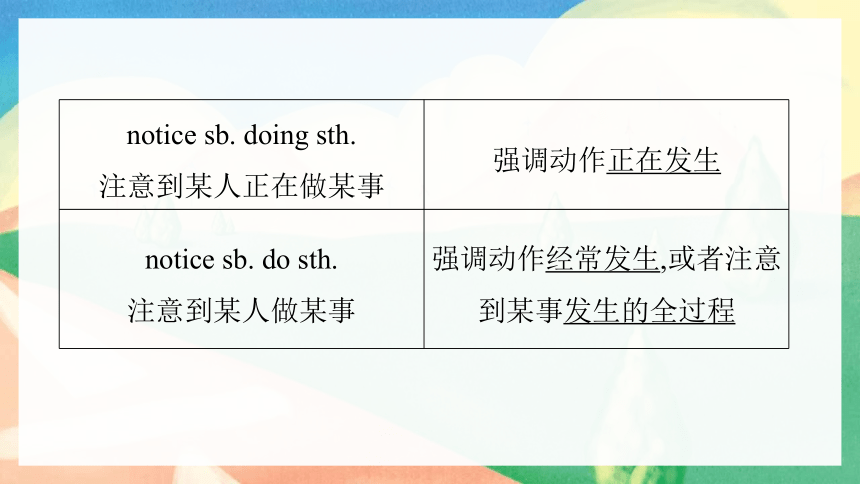
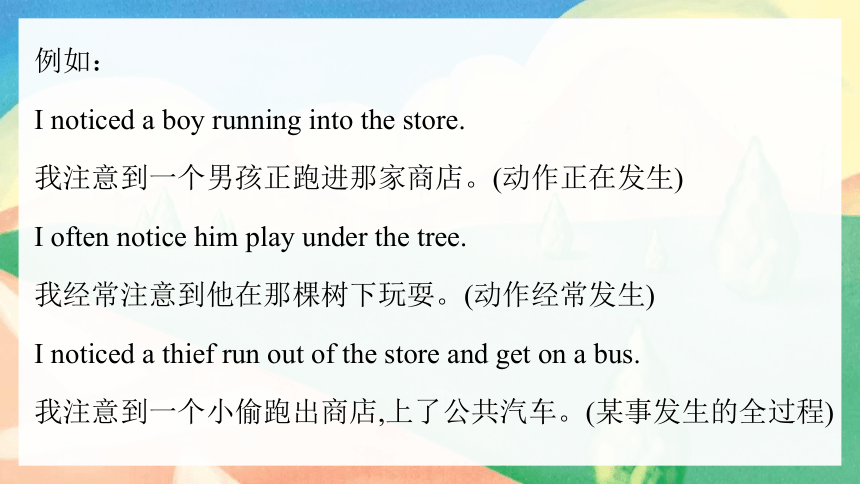
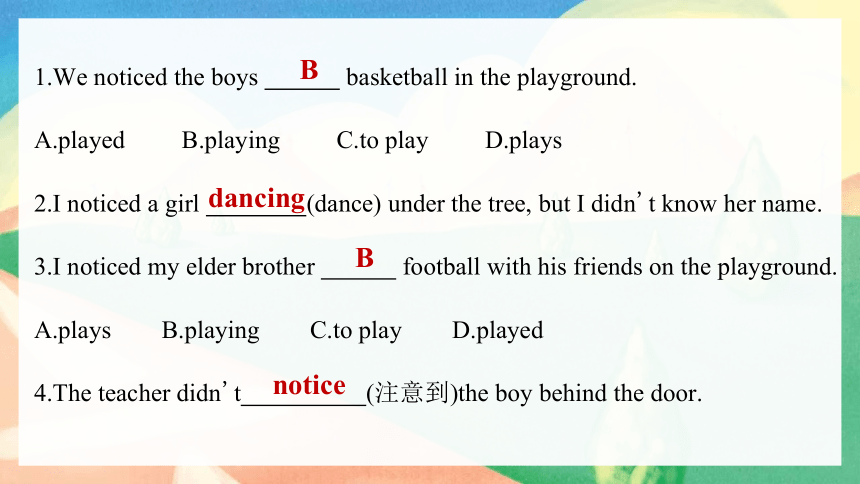
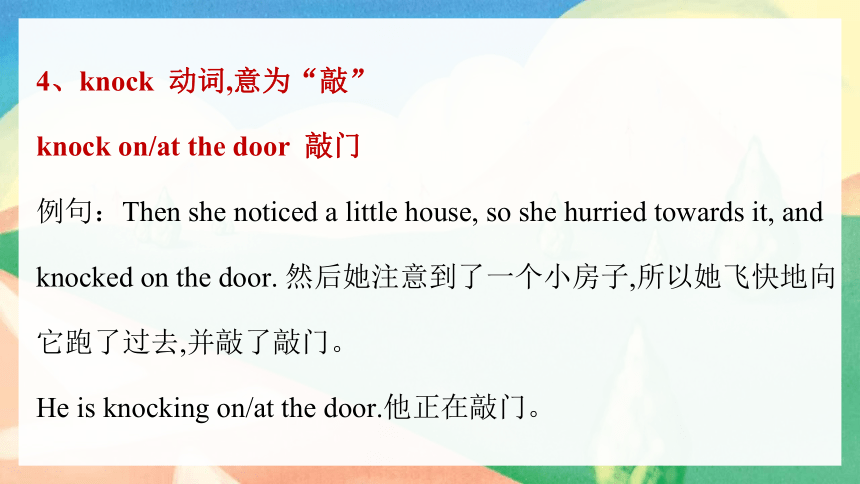
文档简介
(共51张PPT)
Module 8
Story time
1、once upon a time 从前,是一般过去时的标志
例句:
The story begins:Once upon a time...
这个故事的开头是:从前……
Once upon a time, there was a king who loved horses.
从前,有一个很喜欢马的国王。
1.Once upon a time, there a little girl called Goldilocks.
A.is B.are C.was D.were
2.从前,有一个善良的渔夫。
,there was a kind fisherman.
3.—How often do you go swimming
—O or twice a week.
4.从前,一些村民居住在那个村庄里。
, some villagers lived in the village.
5.从前,山上有一座庙。
Once upon a time, there was a temple on the mountain.
C
Once upon a time
Once upon a time
Once
2、decide 动词,意为“决定”
decide to do sth. 决定做某事
例句:She decided to go for a walk in the park with her basket.
她决定拿着篮子去公园散步。
Yesterday they decided to visit the museum.
昨天他们决定去参观博物馆。
派生词:decision n.决定;果断 短语:make a decision 作出决定
1.The college student decided children in the west of China.
A.teaching B.to teach C.teach
2.He (决定) to help Jane because he didn't want
to see the same thing happen to her.
3.Mr. Zhou is good at cooking and he has decided his own restaurant.
A.open B.opened C.to open D.opening
4.昨天我决定制订一个旅行计划。
Yesterday I a travel plan.
B
C
decided
decided to make
5.They haven't made a (decide)where to spend
their summer vacation.
6.—Do you have any plans for the coming vacation
—Sure. We decide Sansha in July.
A.visit B.visiting C.visited D.to visit
7.Mary decided lunch at school.
A.have B.having C.had D.to have
8.他决定长大以后要当一名医生。
He a doctor when he grows up.
D
D
decision
decides to be
9.—Jack, why have you decided Chinese folk music as a course
—To learn more about Chinese culture.
A.take B.taken C.taking D.to take
10.After two hours' drive, the driver decided and have a rest.
A.stop B.to stop C.stopping
11.去年莉萨决定出国留学。
Last year Lisa decided to study abroad.
12.You should learn to make a (decide)by yourself.
D
B
decision
3、 notice 动词,意为“注意到”
例句:
Then she noticed a little house, so she hurried towards it, and knocked on the door.
然后她注意到了一个小房子,所以她飞快地向它跑了过去,并敲了敲门。
I noticed a girl crying in the corner.
我注意到一个女孩正在角落里哭泣。
notice sb. doing sth. 注意到某人正在做某事 强调动作正在发生
notice sb. do sth. 注意到某人做某事 强调动作经常发生,或者注意到某事发生的全过程
例如:
I noticed a boy running into the store.
我注意到一个男孩正跑进那家商店。(动作正在发生)
I often notice him play under the tree.
我经常注意到他在那棵树下玩耍。(动作经常发生)
I noticed a thief run out of the store and get on a bus.
我注意到一个小偷跑出商店,上了公共汽车。(某事发生的全过程)
1.We noticed the boys basketball in the playground.
A.played B.playing C.to play D.plays
2.I noticed a girl (dance) under the tree, but I didn't know her name.
3.I noticed my elder brother football with his friends on the playground.
A.plays B.playing C.to play D.played
4.The teacher didn't (注意到)the boy behind the door.
B
B
dancing
notice
4、knock 动词,意为“敲”
knock on/at the door 敲门
例句:Then she noticed a little house, so she hurried towards it, and knocked on the door. 然后她注意到了一个小房子,所以她飞快地向它跑了过去,并敲了敲门。
He is knocking on/at the door.他正在敲门。
1.I /n kt/at the door, but there was no answer.
2.I k at the gate, but nobody answered.
3.在你进我的房间之前,不要忘记先敲门。
Don't forget to before you go into my room.
4.Someone k on the door. I opened the door and saw a young lady.
5.谁在敲门?
Who is
knocked
knocked
knock at/on the door
knocked
knock at/on the door
5、answer 动词,意为“应门;回答”
例句:
Nobody answered, so she knocked again, and again.
没有人回应,所以她又反复敲门。
I knocked at the door, but nobody answered.
我敲了敲门,但没有人应门。
I can't answer the question.我不会回答这个问题。
answer还可以作名词,意为“答案”。表示“……的答案”时,和answer搭配的介词是to,即the answer to the question
例如:
I don't know the answer to the question.
我不知道这个问题的答案。
1.This question is very difficult for me. I can't a it.
2.Class begins!Listen carefully and a my questions.
answer
answer
6、enter 动词,意为“进入”,相当于go/walk into
例句:
Goldilocks entered the house and looked into a small room.
金凤花姑娘进了那所房子,向一个小房间里看了过去。
He entered the classroom from the back door and nobody noticed him.
他通过后面的门进入了教室,没有人注意到他。
1.You should always knock at the door before you e a room.
2.I was late and I didn't want to trouble other students, so I
e the classroom quietly from the back door.
3.Jack (进入)the classroom quietly just now(刚才).
enter
enter
enter
7、 pick up 捡起;拿起;举起
例句:
She picked up the very big bowl but she didn't like it...
她拿起那个很大的碗,但是她并不喜欢它……
它的宾语的位置有如下两种情况:
例如:Please help me pick up the books.
=Please help me pick the books up.请帮我把这些书捡起来。
I picked them up and put them on the table.
我把它们捡了起来,并把它们放在了桌子上。
宾语是名词 该名词可以位于pick和up之间,
也可以位于pick up之后
宾语是代词 该代词只能位于pick和up之间
注意 pick up表示“捡起;拿起;举起”,而pick的含义是“采;摘”,此时它跟表示花或果实的词汇搭配,如flower、apple等。例如:The boy is picking apples.
那个男孩正在摘苹果。
There is an apple on the ground. Please pick it up.
地上有一个苹果,请把它捡起来。
1.—Look!What's on the ground
—Oh, it's my sweater. Please help me .
A.pick it up B.put it on
C.give it out D.take it zoff
2.Please don't p any flowers when you are in the garden.
3.露西把书捡了起来并把它放在了桌子上。
Lucy the book and put it on the desk.
4.昨天我在花园里摘了一些花。
I in the garden yesterday.
A
pick
picked up
picked some flowers
5.There are some leaves there. Please .
A.try on them B.pick up them
C.try them on D.pick them up
6. He walked into the garden and (摘) some flowers.
7.There was a book on the ground.The teacher asked me to p it up.
D
picked
pick
8、asleep 形容词,意为“睡着的”,fall asleep 睡着;入睡
例句:Very soon she was asleep in it.
她很快就在床上睡着了。
My father was so tired that he fell asleep soon.
我爸爸太累了,很快就睡着了。
同根词:sleep v. & n. 睡觉 sleepy adj. 瞌睡的;困倦的
注意 asleep是表语形容词,在句中只能作表语,不能作定语。以a-开头的许多形容词都属于表语形容词,如awake“醒着的”、alive“活着的”、afraid“害怕的”等。
1.—You look so tired. What's wrong
—I can't at night these days. So I always feel sleepy.
A.look around B.get ready C.fall asleep
2.The little boy stopped crying and very soon he was (睡着的).
3.Jimmy could not sleep at first. He finally fell (sleep)when the
rainstorm stopped at midnight.
4.玛丽很累,她在椅子上就睡着了。
Mary so that she on the chair.
5.He fell (sleep)as soon as he went to bed.
6.The man was so tired that he fell (睡着的)soon.
C
asleep
asleep
was tired fell asleep
asleep
asleep
9、either 副词,意为“也(不)”,通常位于否定句句尾。
例句:First, she tried the big chair, but it wasn't very comfortable. Then she tried the middle chair. It was not comfortable either.
首先,她试着坐那把大椅子,但不太舒服,然后她又试了试那把中等大小的椅子,也不舒服。
I don't like the lion. My sister doesn't like it either.
我不喜欢那头狮子,我妹妹也不喜欢它。
易混词辨析
too 通常位于肯定句句尾,
而且too之前通常用逗号和前面隔开
also 通常位于肯定句句中,
即行为动词之前,be动词、情态动词或助动词之后
as well 常用在口语中,可以和too进行互换,
也位于句尾,as well前不必加逗号
例如:
I went to the party. She went there, too.
我去参加聚会了,她也去了。
He is good at English. He is also good at Japanese.
他擅长英语,他还擅长日语。
I am going to Paris and my brother is going as well.
我要到巴黎去,我弟弟也要去。
1.Carol doesn't like green tea. Joe doesn't like it, .
A.too B.also C.or D.either
2.I can't watch TV. I can't play basketball, . Why
A.too B.either C.also D.or
3.My sister doesn't like red.I don't like it, e .
D
B
either
10、return 动词,意为“回来;返回”=come/go/get back
例句:
The Three Bears returned. 三只熊回来了。
She will return to China in two days.
=She will come/go/get back to China in two days.
她将在两天后返回中国。
return还有“归还”之意,此时是及物动词,相当于give back。
例如:
I will return the book to you this afternoon.
=I will give back the book/give the book back to you this afternoon. 我今天下午会把书还给你。
1.We will come back to school in two months. (同义句转换)
We will school in two months.
2.I will (归还)the book to him.
3.She borrowed a book from me, but she forgot to r it to me.
4.—How long can I keep this dictionary
—Two weeks. You must it on time.
A.collect B.call C.return
5.—Here are the workbooks.
—Thank you. I'll them on time.
A.keep B.return C.borrow
C
B
return to
return
return
11、at first 起初;一开始
例句:
They didn't notice Goldilocks at first.
他们一开始没有注意到金凤花姑娘。
At first, I disliked the school. But soon I fell in love with it.
一开始,我并不喜欢这所学校。但很快我爱上了它。
1.一开始我不太喜欢这个工作。
I didn't like the job very much .
2.一开始,我并没有注意到那个标识。
, I didn't notice the sign.
3.一开始,我没有看到他。
I didn't see him .
at first
at first
At first
12、point at 指向;指着,其中point作动词,意为“指向;指”。
例句:
Then Baby Bear pointed at the little girl in his bed and shouted,
“Look! There's the bad girl!”
然后,熊宝宝指着他床上的小女孩喊了起来:“看!那个坏女孩在那儿呢!”
Don't point at others with your chopsticks.
不要用你的筷子指着别人。
1.It's not polite to p (指)at others with your finger.
2.Be polite, Henry. It's rude to (指向)at others like that.
3.这个男孩正指着桌上的那本书。
The boy is the book on the table.
4.他指着地上的钱包问了他的爸爸一个问题。
He the wallet on the ground and asked his father a question.
5.用你的筷子指着别人是不礼貌的。
It's not polite to point at others with your chopsticks.
point
point
pointing at
pointed at
13、without 介词,意为“无;没有”,是表示否定意义的介词,反义词是with。
例句:The Three Bears were all around her, so Goldilocks jumped out of
bed and hurried out of the house without her basket.
三只熊都围在金凤花姑娘身边,于是她从床上跳下来,也顾不上提篮子,就冲出了房子。
You can't leave the country without a passport.
没有护照,你就不能离开这个国家。
He left the room without saying anything.
他一言不发地离开了房间。
1.It's bad for you to go to school (没有) breakfast.
2.Nobody could solve this difficult problem alone others' help.
A.with B.for C.without D.from
3.I would not get an A in my English exam your help.
A.with B.without C.for D.as
4.—Reading is a good way to spend the time on the plane.
—That's true. I never go travelling a book.
A.without B.from C.on D.about
5.I can't buy anything w money.
C
B
A
without
without
6.He left the room without (say)goodbye to us.
7.Man cannot live w air.
8. your help, I can't get good grades.
A.With B.Without C.For
9.He left the room without (say)anything.
10.My sister went to school.She didn't eat breakfast.(用without 连成一个句子)
My sister went to school without (eating) breakfast.
B
saying
without
saying
14、辨析:alone,lonely
alone 形容词,意为“单独的;独自的”,只能做表语,不能做定语;还可以作副词,意为“单独;独自”。
一般强调独自一人,没有感彩
lonely 形容词,意为“寂寞的;孤独的”。
强调寂寞、孤独的感觉,有感彩
例句:
She always enjoys watching TV when she is alone at home.
她独自在家时,总是喜欢看电视。
I don't want to go out alone after dark.
我不想天黑后独自外出。
After his wife died,he felt very lonely.
在他太太去世以后,他觉得非常孤独。
1.The old man lives but he never feels because he has many friends.
A.alone;alone B.lonely;lonely
C.alone;lonely D.lonely;alone
2.When you feel helpless and , just remember you are not
in the world because your friends are around you.
A.alone;alone B.alone;lonely C.lonely;alone
3.Lily went to a big city to find a job.So her mother lived and felt .
A.alone;alone B.lonely;lonely
C.alone;lonely D.lonely;alone
C
C
C
15、一般过去时(2)
<1>行为动词的过去式的规则变化
在动词原形后加-ed work→worked
以不发音的字母e结尾的动词,直接加-d live→lived
以辅音字母加y结尾的动词,变y为i再加-ed study→studied
以一个辅音字母结尾的重读闭音节动词,先双写该辅音字母,再加-ed stop→stopped
plan→planned
肯定句 主语+动词过去式+其他.
否定句 主语+didn't+动词原形+其他.
一般疑问句 Did+主语+动词原形+其他
肯定回答 Yes,主语+did.
否定回答 No,主语+didn't.
<2>行为动词构成的一般过去时的句子的句式变化
例句:
They went to Beijing last week.他们上周去北京了。
They didn't go to Beijing last week.他们上周没有去北京。
Did they go to Beijing last week 他们上周去北京了吗
Yes, they did.是的,他们去了。
No, they didn't.不,他们没去。
1.Joan did the housework yesterday. (改为一般疑问句)
Joan the housework yesterday
2.They had a great time on the farm last week. (改为否定句)
They a great time on the farm last week.
3.Did Lisa have fun at the party (作肯定回答)
Yes, .
4.They are going to visit the Summer Palace tomorrow.
(把tomorrow改为yesterday)
They the Summer Palace .
Did do
didn't have
she did
visited yesterday
5.She moved to the countryside.(改为一般疑问句,并作否定回答)
— to the countryside
—No, .
6.He saw a kangaroo at the zoo.(对画线部分提问)
he at the zoo
7.The little girl doesn't like the food on the table.
(用yesterday morning改写句子)
The little girl the food on the table yesterday morning.
8.Thomas hit the ball over the wall. (改为否定句)
Thomas the ball over the wall.
Did she move
she didn't
What did see
didn't like
didn't hit
9.Lucy didn't go out because it rained heavily yesterday.(对画线部分提问)
Lucy out yesterday
10.I stayed at home last night. (改为否定句)
I didn't stay at home last night.
11.She went to the zoo by bike. (改为一般疑问句)
Did she go to the zoo by bike
12.They saw a wallet on the ground.(改为一般疑问句)
Did they see a wallet on the ground
Why didn't go
13.The old man moved to the countryside.(改为一般疑问句,并作肯定回答)
—Did the old man move to the countryside
—Yes, he did.
14.Roy did his homework after dinner yesterday evening. (改为否定句)
Roy his homework after dinner yesterday evening.
15.My grandfather bought a bird.(改为一般疑问句)
your grandfather a bird
16.Did Tom stay at home (作肯定回答)
Yes, .
didn't do
Did buy
he did
17.We don't buy anything to eat in that supermarket. (用yesterday 改写句子)
We anything to eat in that supermarket yesterday.
18.Last night I was very tired and I to bed early.
A.go B.will go C.am going D.went
19.The debate on whether to keep pets forty minutes yesterday afternoon.
A.last B.lasted C.will last D.has lasted
20.—Does Jane want to watch the play
—No, she it three days ago.
A.watch B.watches C.watched D.will watch
D
B
C
didn't buy
D
B
C
didn't buy
21.—Did you go to the zoo yesterday
— . I went to a farm.
A.Yes, I did B.No, I didn't
C.Yes, I was D.No, I wasn't
22.Peter his document yesterday afternoon.
A.won't save B.isn't saving
C.didn't save D.doesn't save
23.—It's very dangerous to swim in the pool. Look at the sign.
—Oh, I notice it. Thanks for telling me.
A.won't B.don't C.haven't D.didn't
B
C
D
Module 8
Story time
1、once upon a time 从前,是一般过去时的标志
例句:
The story begins:Once upon a time...
这个故事的开头是:从前……
Once upon a time, there was a king who loved horses.
从前,有一个很喜欢马的国王。
1.Once upon a time, there a little girl called Goldilocks.
A.is B.are C.was D.were
2.从前,有一个善良的渔夫。
,there was a kind fisherman.
3.—How often do you go swimming
—O or twice a week.
4.从前,一些村民居住在那个村庄里。
, some villagers lived in the village.
5.从前,山上有一座庙。
Once upon a time, there was a temple on the mountain.
C
Once upon a time
Once upon a time
Once
2、decide 动词,意为“决定”
decide to do sth. 决定做某事
例句:She decided to go for a walk in the park with her basket.
她决定拿着篮子去公园散步。
Yesterday they decided to visit the museum.
昨天他们决定去参观博物馆。
派生词:decision n.决定;果断 短语:make a decision 作出决定
1.The college student decided children in the west of China.
A.teaching B.to teach C.teach
2.He (决定) to help Jane because he didn't want
to see the same thing happen to her.
3.Mr. Zhou is good at cooking and he has decided his own restaurant.
A.open B.opened C.to open D.opening
4.昨天我决定制订一个旅行计划。
Yesterday I a travel plan.
B
C
decided
decided to make
5.They haven't made a (decide)where to spend
their summer vacation.
6.—Do you have any plans for the coming vacation
—Sure. We decide Sansha in July.
A.visit B.visiting C.visited D.to visit
7.Mary decided lunch at school.
A.have B.having C.had D.to have
8.他决定长大以后要当一名医生。
He a doctor when he grows up.
D
D
decision
decides to be
9.—Jack, why have you decided Chinese folk music as a course
—To learn more about Chinese culture.
A.take B.taken C.taking D.to take
10.After two hours' drive, the driver decided and have a rest.
A.stop B.to stop C.stopping
11.去年莉萨决定出国留学。
Last year Lisa decided to study abroad.
12.You should learn to make a (decide)by yourself.
D
B
decision
3、 notice 动词,意为“注意到”
例句:
Then she noticed a little house, so she hurried towards it, and knocked on the door.
然后她注意到了一个小房子,所以她飞快地向它跑了过去,并敲了敲门。
I noticed a girl crying in the corner.
我注意到一个女孩正在角落里哭泣。
notice sb. doing sth. 注意到某人正在做某事 强调动作正在发生
notice sb. do sth. 注意到某人做某事 强调动作经常发生,或者注意到某事发生的全过程
例如:
I noticed a boy running into the store.
我注意到一个男孩正跑进那家商店。(动作正在发生)
I often notice him play under the tree.
我经常注意到他在那棵树下玩耍。(动作经常发生)
I noticed a thief run out of the store and get on a bus.
我注意到一个小偷跑出商店,上了公共汽车。(某事发生的全过程)
1.We noticed the boys basketball in the playground.
A.played B.playing C.to play D.plays
2.I noticed a girl (dance) under the tree, but I didn't know her name.
3.I noticed my elder brother football with his friends on the playground.
A.plays B.playing C.to play D.played
4.The teacher didn't (注意到)the boy behind the door.
B
B
dancing
notice
4、knock 动词,意为“敲”
knock on/at the door 敲门
例句:Then she noticed a little house, so she hurried towards it, and knocked on the door. 然后她注意到了一个小房子,所以她飞快地向它跑了过去,并敲了敲门。
He is knocking on/at the door.他正在敲门。
1.I /n kt/at the door, but there was no answer.
2.I k at the gate, but nobody answered.
3.在你进我的房间之前,不要忘记先敲门。
Don't forget to before you go into my room.
4.Someone k on the door. I opened the door and saw a young lady.
5.谁在敲门?
Who is
knocked
knocked
knock at/on the door
knocked
knock at/on the door
5、answer 动词,意为“应门;回答”
例句:
Nobody answered, so she knocked again, and again.
没有人回应,所以她又反复敲门。
I knocked at the door, but nobody answered.
我敲了敲门,但没有人应门。
I can't answer the question.我不会回答这个问题。
answer还可以作名词,意为“答案”。表示“……的答案”时,和answer搭配的介词是to,即the answer to the question
例如:
I don't know the answer to the question.
我不知道这个问题的答案。
1.This question is very difficult for me. I can't a it.
2.Class begins!Listen carefully and a my questions.
answer
answer
6、enter 动词,意为“进入”,相当于go/walk into
例句:
Goldilocks entered the house and looked into a small room.
金凤花姑娘进了那所房子,向一个小房间里看了过去。
He entered the classroom from the back door and nobody noticed him.
他通过后面的门进入了教室,没有人注意到他。
1.You should always knock at the door before you e a room.
2.I was late and I didn't want to trouble other students, so I
e the classroom quietly from the back door.
3.Jack (进入)the classroom quietly just now(刚才).
enter
enter
enter
7、 pick up 捡起;拿起;举起
例句:
She picked up the very big bowl but she didn't like it...
她拿起那个很大的碗,但是她并不喜欢它……
它的宾语的位置有如下两种情况:
例如:Please help me pick up the books.
=Please help me pick the books up.请帮我把这些书捡起来。
I picked them up and put them on the table.
我把它们捡了起来,并把它们放在了桌子上。
宾语是名词 该名词可以位于pick和up之间,
也可以位于pick up之后
宾语是代词 该代词只能位于pick和up之间
注意 pick up表示“捡起;拿起;举起”,而pick的含义是“采;摘”,此时它跟表示花或果实的词汇搭配,如flower、apple等。例如:The boy is picking apples.
那个男孩正在摘苹果。
There is an apple on the ground. Please pick it up.
地上有一个苹果,请把它捡起来。
1.—Look!What's on the ground
—Oh, it's my sweater. Please help me .
A.pick it up B.put it on
C.give it out D.take it zoff
2.Please don't p any flowers when you are in the garden.
3.露西把书捡了起来并把它放在了桌子上。
Lucy the book and put it on the desk.
4.昨天我在花园里摘了一些花。
I in the garden yesterday.
A
pick
picked up
picked some flowers
5.There are some leaves there. Please .
A.try on them B.pick up them
C.try them on D.pick them up
6. He walked into the garden and (摘) some flowers.
7.There was a book on the ground.The teacher asked me to p it up.
D
picked
pick
8、asleep 形容词,意为“睡着的”,fall asleep 睡着;入睡
例句:Very soon she was asleep in it.
她很快就在床上睡着了。
My father was so tired that he fell asleep soon.
我爸爸太累了,很快就睡着了。
同根词:sleep v. & n. 睡觉 sleepy adj. 瞌睡的;困倦的
注意 asleep是表语形容词,在句中只能作表语,不能作定语。以a-开头的许多形容词都属于表语形容词,如awake“醒着的”、alive“活着的”、afraid“害怕的”等。
1.—You look so tired. What's wrong
—I can't at night these days. So I always feel sleepy.
A.look around B.get ready C.fall asleep
2.The little boy stopped crying and very soon he was (睡着的).
3.Jimmy could not sleep at first. He finally fell (sleep)when the
rainstorm stopped at midnight.
4.玛丽很累,她在椅子上就睡着了。
Mary so that she on the chair.
5.He fell (sleep)as soon as he went to bed.
6.The man was so tired that he fell (睡着的)soon.
C
asleep
asleep
was tired fell asleep
asleep
asleep
9、either 副词,意为“也(不)”,通常位于否定句句尾。
例句:First, she tried the big chair, but it wasn't very comfortable. Then she tried the middle chair. It was not comfortable either.
首先,她试着坐那把大椅子,但不太舒服,然后她又试了试那把中等大小的椅子,也不舒服。
I don't like the lion. My sister doesn't like it either.
我不喜欢那头狮子,我妹妹也不喜欢它。
易混词辨析
too 通常位于肯定句句尾,
而且too之前通常用逗号和前面隔开
also 通常位于肯定句句中,
即行为动词之前,be动词、情态动词或助动词之后
as well 常用在口语中,可以和too进行互换,
也位于句尾,as well前不必加逗号
例如:
I went to the party. She went there, too.
我去参加聚会了,她也去了。
He is good at English. He is also good at Japanese.
他擅长英语,他还擅长日语。
I am going to Paris and my brother is going as well.
我要到巴黎去,我弟弟也要去。
1.Carol doesn't like green tea. Joe doesn't like it, .
A.too B.also C.or D.either
2.I can't watch TV. I can't play basketball, . Why
A.too B.either C.also D.or
3.My sister doesn't like red.I don't like it, e .
D
B
either
10、return 动词,意为“回来;返回”=come/go/get back
例句:
The Three Bears returned. 三只熊回来了。
She will return to China in two days.
=She will come/go/get back to China in two days.
她将在两天后返回中国。
return还有“归还”之意,此时是及物动词,相当于give back。
例如:
I will return the book to you this afternoon.
=I will give back the book/give the book back to you this afternoon. 我今天下午会把书还给你。
1.We will come back to school in two months. (同义句转换)
We will school in two months.
2.I will (归还)the book to him.
3.She borrowed a book from me, but she forgot to r it to me.
4.—How long can I keep this dictionary
—Two weeks. You must it on time.
A.collect B.call C.return
5.—Here are the workbooks.
—Thank you. I'll them on time.
A.keep B.return C.borrow
C
B
return to
return
return
11、at first 起初;一开始
例句:
They didn't notice Goldilocks at first.
他们一开始没有注意到金凤花姑娘。
At first, I disliked the school. But soon I fell in love with it.
一开始,我并不喜欢这所学校。但很快我爱上了它。
1.一开始我不太喜欢这个工作。
I didn't like the job very much .
2.一开始,我并没有注意到那个标识。
, I didn't notice the sign.
3.一开始,我没有看到他。
I didn't see him .
at first
at first
At first
12、point at 指向;指着,其中point作动词,意为“指向;指”。
例句:
Then Baby Bear pointed at the little girl in his bed and shouted,
“Look! There's the bad girl!”
然后,熊宝宝指着他床上的小女孩喊了起来:“看!那个坏女孩在那儿呢!”
Don't point at others with your chopsticks.
不要用你的筷子指着别人。
1.It's not polite to p (指)at others with your finger.
2.Be polite, Henry. It's rude to (指向)at others like that.
3.这个男孩正指着桌上的那本书。
The boy is the book on the table.
4.他指着地上的钱包问了他的爸爸一个问题。
He the wallet on the ground and asked his father a question.
5.用你的筷子指着别人是不礼貌的。
It's not polite to point at others with your chopsticks.
point
point
pointing at
pointed at
13、without 介词,意为“无;没有”,是表示否定意义的介词,反义词是with。
例句:The Three Bears were all around her, so Goldilocks jumped out of
bed and hurried out of the house without her basket.
三只熊都围在金凤花姑娘身边,于是她从床上跳下来,也顾不上提篮子,就冲出了房子。
You can't leave the country without a passport.
没有护照,你就不能离开这个国家。
He left the room without saying anything.
他一言不发地离开了房间。
1.It's bad for you to go to school (没有) breakfast.
2.Nobody could solve this difficult problem alone others' help.
A.with B.for C.without D.from
3.I would not get an A in my English exam your help.
A.with B.without C.for D.as
4.—Reading is a good way to spend the time on the plane.
—That's true. I never go travelling a book.
A.without B.from C.on D.about
5.I can't buy anything w money.
C
B
A
without
without
6.He left the room without (say)goodbye to us.
7.Man cannot live w air.
8. your help, I can't get good grades.
A.With B.Without C.For
9.He left the room without (say)anything.
10.My sister went to school.She didn't eat breakfast.(用without 连成一个句子)
My sister went to school without (eating) breakfast.
B
saying
without
saying
14、辨析:alone,lonely
alone 形容词,意为“单独的;独自的”,只能做表语,不能做定语;还可以作副词,意为“单独;独自”。
一般强调独自一人,没有感彩
lonely 形容词,意为“寂寞的;孤独的”。
强调寂寞、孤独的感觉,有感彩
例句:
She always enjoys watching TV when she is alone at home.
她独自在家时,总是喜欢看电视。
I don't want to go out alone after dark.
我不想天黑后独自外出。
After his wife died,he felt very lonely.
在他太太去世以后,他觉得非常孤独。
1.The old man lives but he never feels because he has many friends.
A.alone;alone B.lonely;lonely
C.alone;lonely D.lonely;alone
2.When you feel helpless and , just remember you are not
in the world because your friends are around you.
A.alone;alone B.alone;lonely C.lonely;alone
3.Lily went to a big city to find a job.So her mother lived and felt .
A.alone;alone B.lonely;lonely
C.alone;lonely D.lonely;alone
C
C
C
15、一般过去时(2)
<1>行为动词的过去式的规则变化
在动词原形后加-ed work→worked
以不发音的字母e结尾的动词,直接加-d live→lived
以辅音字母加y结尾的动词,变y为i再加-ed study→studied
以一个辅音字母结尾的重读闭音节动词,先双写该辅音字母,再加-ed stop→stopped
plan→planned
肯定句 主语+动词过去式+其他.
否定句 主语+didn't+动词原形+其他.
一般疑问句 Did+主语+动词原形+其他
肯定回答 Yes,主语+did.
否定回答 No,主语+didn't.
<2>行为动词构成的一般过去时的句子的句式变化
例句:
They went to Beijing last week.他们上周去北京了。
They didn't go to Beijing last week.他们上周没有去北京。
Did they go to Beijing last week 他们上周去北京了吗
Yes, they did.是的,他们去了。
No, they didn't.不,他们没去。
1.Joan did the housework yesterday. (改为一般疑问句)
Joan the housework yesterday
2.They had a great time on the farm last week. (改为否定句)
They a great time on the farm last week.
3.Did Lisa have fun at the party (作肯定回答)
Yes, .
4.They are going to visit the Summer Palace tomorrow.
(把tomorrow改为yesterday)
They the Summer Palace .
Did do
didn't have
she did
visited yesterday
5.She moved to the countryside.(改为一般疑问句,并作否定回答)
— to the countryside
—No, .
6.He saw a kangaroo at the zoo.(对画线部分提问)
he at the zoo
7.The little girl doesn't like the food on the table.
(用yesterday morning改写句子)
The little girl the food on the table yesterday morning.
8.Thomas hit the ball over the wall. (改为否定句)
Thomas the ball over the wall.
Did she move
she didn't
What did see
didn't like
didn't hit
9.Lucy didn't go out because it rained heavily yesterday.(对画线部分提问)
Lucy out yesterday
10.I stayed at home last night. (改为否定句)
I didn't stay at home last night.
11.She went to the zoo by bike. (改为一般疑问句)
Did she go to the zoo by bike
12.They saw a wallet on the ground.(改为一般疑问句)
Did they see a wallet on the ground
Why didn't go
13.The old man moved to the countryside.(改为一般疑问句,并作肯定回答)
—Did the old man move to the countryside
—Yes, he did.
14.Roy did his homework after dinner yesterday evening. (改为否定句)
Roy his homework after dinner yesterday evening.
15.My grandfather bought a bird.(改为一般疑问句)
your grandfather a bird
16.Did Tom stay at home (作肯定回答)
Yes, .
didn't do
Did buy
he did
17.We don't buy anything to eat in that supermarket. (用yesterday 改写句子)
We anything to eat in that supermarket yesterday.
18.Last night I was very tired and I to bed early.
A.go B.will go C.am going D.went
19.The debate on whether to keep pets forty minutes yesterday afternoon.
A.last B.lasted C.will last D.has lasted
20.—Does Jane want to watch the play
—No, she it three days ago.
A.watch B.watches C.watched D.will watch
D
B
C
didn't buy
D
B
C
didn't buy
21.—Did you go to the zoo yesterday
— . I went to a farm.
A.Yes, I did B.No, I didn't
C.Yes, I was D.No, I wasn't
22.Peter his document yesterday afternoon.
A.won't save B.isn't saving
C.didn't save D.doesn't save
23.—It's very dangerous to swim in the pool. Look at the sign.
—Oh, I notice it. Thanks for telling me.
A.won't B.don't C.haven't D.didn't
B
C
D
同课章节目录
